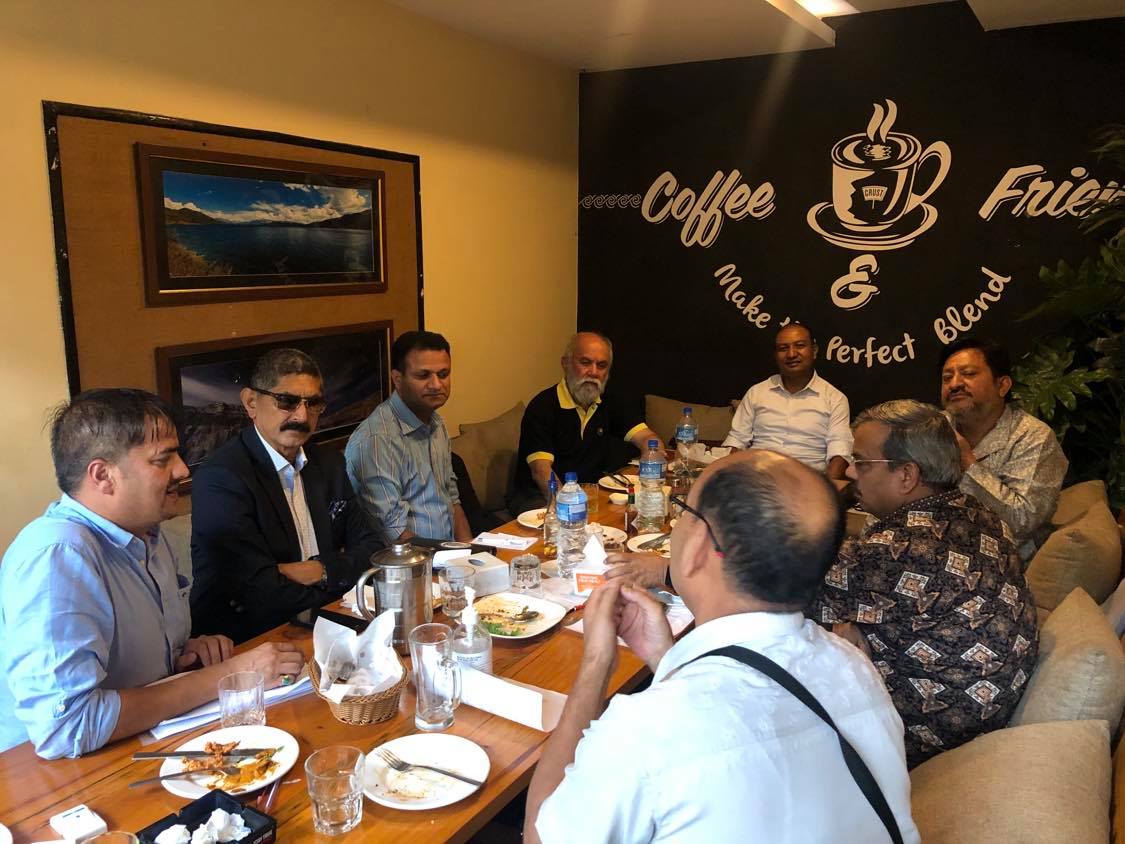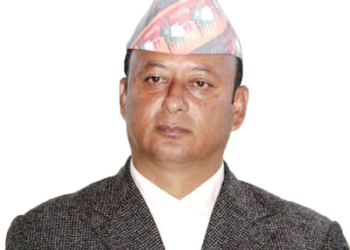Nepal Centre for Security Governance (NCSG) convened an expert round-table in Kathmandu to discuss the challenges posed by the Covid-19 pandemic in the security sector and ways to address them, especially important at this situation encountering sharp spike in coronavirus cases.
The roundtable was a part of NCSG’s National Working Group meeting featured active participation of distinguished individuals representing the country’s security sector including Nepali Army, Nepal Police and Armed Police Force.
Similarly, policymakers, human rights advocates, and research scholars were also part of the meeting.
Not to mention, preventive guidelines issued by the Government were fully respected during the meeting.
While some countries of Asia are now starting to see confirmed cases and deaths fall, others are still seeing figures rise, particularly in South Asian countries like India, Pakistan and Nepal.
The situation is getting troublesome in Nepal in recent days with spikes in cases despite government’s lockdown restrictions put in place for the last three months and more.
This shortfall to contain the transmission in Nepal can be largely tagged to the negligence and incompetence displayed by government mechanisms.
To some extent, Nepal’s security sector is also responsible for what is happening, due to challenges seen in coordination and cooperation between different security organs.
Security experts analyzed that deployment of health workers by the Epidemiology and Disease Control Division (EDCD) to control the infection has been struggled.
Before their deployment health professionals are not assessed for their physical readiness and mental wellbeing, which is the reason for their underperformance.
Today, the condition of quarantines across the country is getting more inhuman and turning into potential hotspots for diseases as more and more people are kept within limited space with inadequate facilities.
While some are forced to stay in quarantines for over a month, but for those showing no symptoms are let free without needed testing for COVD-19.
The prolonged lockdown and restriction measures are making middle-class exhausted. The security experts fear this condition could result in an upsurge in looting, vandalism and crime – a state of social unrest.
The misconception is cumulating in people against underperformance of the government, most people lack noticeable support from the government despite the crisis they are living through.
There is fear that returnee migrant workers, farmers and youth may jump-start agitation demanding food security and employment, among others.
Many people are losing their trust in government as they feel alienated by the existing mechanism. Security experts foresee that some farmers could resort to opium farming and other quick income sources if no appropriate recovery package is brought for them.
The meeting participants have highlighted the need for all sectors to work in unison to fight against this pandemic.
In the past, government institutions have worked in isolation and neglected the importance of coordination and cooperation which is the must during any crisis.
The security experts are seen in the same boat to conclude that bringing into frontline the Ministry of Defense while shadowing the role of Health Ministry and Home Ministry in handling Coronavirus pandemic was Government’s failure- shows lack of farsightedness.
Other government organs have never been properly deployed during this pandemic while awareness measures from government institutions are still largely lacking.
Tracking peoples’ mobility would have been possible using mobile tracking options, but that is also no explored so far. Not to mention tracing today seems more than difficult given the current sloppiness in action.
The meeting participants have also emphasized on mismanagement seen in the handling of Nepali returnees coming from foreign countries via airplane. Violations of safety protocols in terms of maintaining social distance, baggage handling, testing and coordination between stakeholders are being common.
Security experts claim: Government is trying to market its incapacity and incompetence in handling increasing coronavirus cases as the bargaining chips for fetching more international support.
The meeting participants also expressed their concerns over the threats posed by cybersecurity. They fear that online classes could lead to bullying of children as they remain at homes without much parental guidance.
There is a strident increase in the use of online meeting platforms like Zoom, but no one is concerned about its security dimension.
Nevertheless, the online platform can be used for surveys and information dissemination vital to control the transmission.
The Central government should initiate virtual meetings with local representatives (of municipalities) and command for necessary actions to control the situation at the local level.
The experts have cautioned that rationing may be needed in the distribution of food and non-food supplies in the coming days, given that our resources are limited and the situation is like wartime.
Nepal lacks enough large scale storage/preservation facilities that make the situation even worse. Therefore, the government is ought to focus on developing its logistic system accordingly.
Today, rather than providing grants there is the need for special direct funding in the agriculture and livestock sector to avoid potential food shortage in Nepal.
The investment in agriculture will also promote employment opportunities for youths and recent returnees, experts demanded.
For the sake of national security, the experts have highlighted the need for strengthening civil-military relationship (CMR).
They also stressed the necessity for border security forces claiming that the presence of such forces at our borders fortifies our sovereignty.
If our neighbors are having such forces at the borders why can’t we, they questioned. Such border outposts should be immediately established prioritizing the sensitive locations.
The experts also considered the possibility that large-size transport containers could be used for temporary settlement of security personnel until permanent structures are made.
They stress the need for Nepal moves ahead with the virtue of modern nation-state.
The security experts have uttered their sadness regarding the inaction of regional institutions like SAARC and BIMSTEC despite the growing health and economic crisis that is paralyzing the South Asian countries.
They, therefore, demanded increased coordination, cooperation, and joint actions between countries in all sectors where possible.
The experts also stressed the need that countries at present should focus on fighting with this pandemic rather than at borders.
(Abhaya R. Joshi is Chairperson of Nepal Center for Security Governance (NCSG). The NCSG has been holding dialogue and discussion series on different issues of national priority related to Human Security, Health Security, and Security Sector Governance in Nepal for the last three years. )









Comment